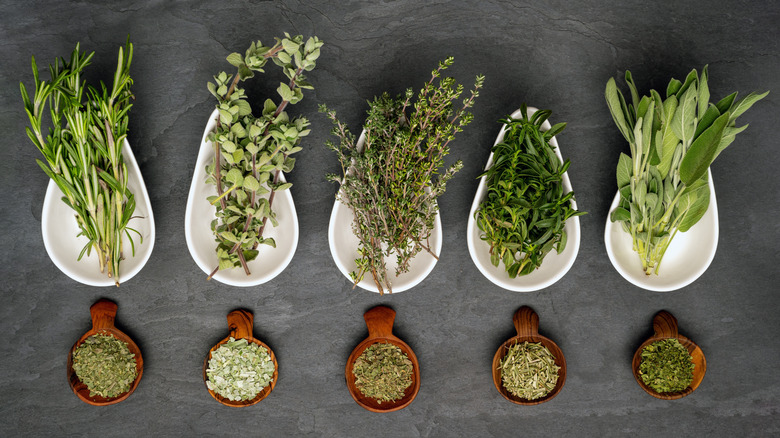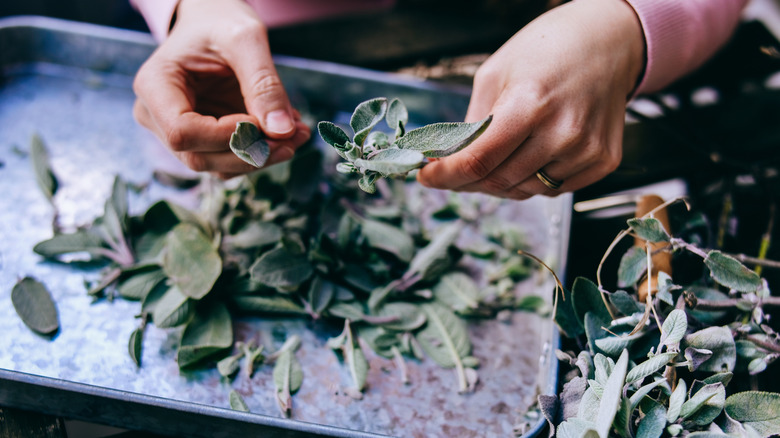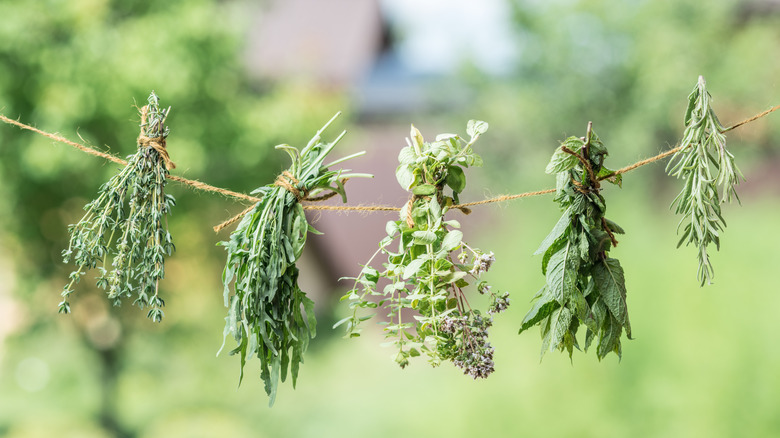How To Make Dried Herbs At Home Without Turning On Your Oven
Dried herbs can be one of the most useful weapons in a home cook's (or professional chef's) arsenal. They're easy to store, last a long time, and are a great way to get a concentrated herbaceous flavor compared with their fresh counterparts into whatever you happen to be cooking. But they can be expensive, and it's impossible to really know how fresh those store-bought herbs were when they were dried out. Making your own, on the other hand, can be a great way to ensure you're getting the fullest flavor possible. This process, though, can also be rather slow ... enter the microwave. By using a microwave to dehydrate your herbs, you shorten the process from hours in an oven (or days by air-drying) to mere minutes, all the while helping preserve the herbs' original color and flavor.
So how do you do it? It's simple, really. You're going to want to start by picking the leaves off the stems of your herb of choice. Place the leaves on a clean kitchen towel, with a second towel on top to cover them. Then, blast them on full power for about a minute (for an 800-watt microwave). To finish, microwave them again, for 20 seconds at a time until they're fully dehydrated. You can adjust your timing depending on the herb -– the above timings work great for rosemary, thyme, and sage, for example, but you may need to reduce the time in the microwave for more delicate herbs such as parsley or cilantro.
The best herbs to dry and how to store them
The good news for wannabe dehydrators is that there isn't really an herb that can't be dried! Some are certainly easier than others, though. Usually, it's less of a challenge to dehydrate stronger, heartier herbs with thick leaves –- think classic roasting herbs like rosemary and thyme. Other hardy options that respond really well to drying include oregano, lovage, and even lavender –- which though not commonly used for cooking really should be because it's delicious in everything from honeyed roast duck to ranch dressing.
You can dry herbs like basil, mint, and cilantro –- but they're less resilient and, as such, will take less time and more care. However, this is where the microwave shines. Usually, these finer herbs would need to be carefully monitored throughout the drying process to avoid any mold beginning to form. With the microwave method, though, this problem is solved! You'll be able to dry delicate herbs efficiently, with no risk of decomposition, without ever touching your oven.
What about storing them? Dried herbs are notoriously long lasting and will be useable for up to six months after dehydration before they lose their flavor. The reason they last so long is simple: Because the drying process removes all the moisture, there's nothing to sustain any bacteria that might grow on the herbs or cause them to rot. To most effectively preserve them, grind your herbs up using a pestle and mortar, and seal them in airtight jars.
Are there ways to make dried herbs without a microwave or an oven?
If you don't have a microwave, or if you just fancy having a go at doing things the traditional way, you can still dry herbs without using your oven. Air-drying has been the go-to method since dried herbs were first prepared by the ancient Egyptians millenia ago. It's easy, fun, and a great way to retain their flavor. Tie your herbs together by their stems in bunches (around an inch thick, at their largest) using either twine or elastic bands. Both work well here, but elastic is particularly reliable, as it will contract along with the herbs themselves as they lose moisture, keeping the bunch together and ensuring you don't lose any stems!
Then, it's as simple as hanging them upside down, out of direct sunlight for anywhere between five days to two weeks, until they're fully dried out. You'll be able to tell when they are done by touching them. They'll feel brittle and break easily. Make sure to keep them away from any areas of moisture and humidity during the drying period, too -– it'll hinder their progress and potentially risk them becoming breeding grounds for bacteria! Once they're dried, grind them up, store them in airtight containers (which you should be doing with your fresh herbs too, by the way), et voila! You have easy, long-lasting, and flavor-packed dried herbs. You'll never want to buy them again.



